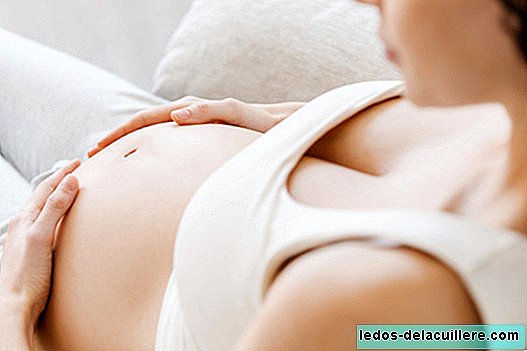There are many women who, while pregnant, explain to others that "I have been told today that I have to rest" because your doctor has considered that it is the best for your health and that of the fetus. We all think so normal because it is an advice of the usual, of those that nobody would doubt.
However, despite how accustomed we are to hear about this recommendation, it seems that there is no evidence that it really helps. But this is not all: making a pregnant woman move little, or practically nothing, adds risks to pregnancy that make, as the famous saying goes, the remedy may be worse than the disease.
What are the reasons why pregnancy rest is recommended?
As we say, many years ago that bed rest is used as a preventive treatment when it is considered that there is a potential problem. It is usually recommended if they see growth problems in the baby, if there is a risk of spontaneous abortion, if the woman has high blood pressure or if there is preeclampsia, if there is a risk of premature delivery, etc. And women, of course, they pay attention to anything recommended to them if this will reduce the risk of something happening to your precious baby, or something happens to them (we all would).
But studies say bed rest doesn't help
Luckily for us, there are several meta-analyzes (these are the studies that analyze a large number of quality studies carried out on a subject and that is why they are the most reliable) related to resting during pregnancy:
Rest to prevent premature births
In January 2010 a meta-analysis was carried out entitled "Bed rest in pregnancies with single fetus for the prevention of premature births" in which the authors concluded the following:
There is no evidence to support or reject the use of hospital or home bed rest for the prevention of premature births. Although hospital or home bed rest is widely used as the first step in treatment, there is no evidence to prove that this practice is beneficial. Due to the potential adverse effects that bed rest can produce on women and their families and the increased costs for health care systems, doctors should not systematically recommend bed rest to prevent premature births. The potential benefits and harms should be discussed with women at high risk of premature births. It is imperative to conduct an appropriate investigation. Future trials should evaluate the effectiveness of bed rest and its prescription to prevent premature births.
Rest for hypertension in pregnancy
In February 2010, a titled meta-analysis was performed "Bed rest with or without hospitalization for hypertension during pregnancy", in which the authors reached this conclusion:
Few randomized trials have evaluated rest for women with high blood pressure during pregnancy, and there is no relevant information on side effects and cost implication in available trials. While a small trial suggests that partial bed rest may be associated with a reduction in the risk of severe hypertension and premature delivery, it is necessary to confirm these results in larger trials.
Currently, the evidence is insufficient to provide clear guidance for clinical practice. Therefore, bed rest should not be systematically recommended for hypertension in pregnancy especially, since apparently there are more women who prefer unrestricted activity, if they have the possibility to choose.

Bed rest in multiple pregnancies
In July 2010 another meta-analysis was done entitled "Hospitalization and bed rest for multiple pregnancy" and the authors saw, when analyzing all the studies, that:
There is currently insufficient evidence to support a routine hospitalization policy for bed rest in multiple pregnancy. There is no evidence of a reduction in the risk of premature birth or perinatal death, although improvement in fetal growth is suggested. For women with twin pregnancy without complications, the results of this review indicate that it can be harmful, since it increases the risk of very premature birth. Until additional evidence is available to support the contrary, this policy cannot be recommended for routine clinical practice.
Rest to avoid spontaneous abortions
In October 2010, a meta-analysis was carried out with the title "Bed rest during pregnancy for the prevention of spontaneous abortion" and the authors saw that:
There is not enough high-quality evidence to support a bed rest policy to prevent spontaneous abortion in women with confirmed fetal viability and vaginal bleeding in the first half of pregnancy.
So is it useless?
Many people will say yes, of course it serves, they recommended rest and thanks to that the baby was saved, or her pregnancy was not premature, or ... but studies do not say that. Studies say that these women would have had the same birth if they had not made restprecisely because when women were at risk and continued with their normal lives, they had the same rates of successful pregnancies and the same rates of problematic pregnancies or births.
But it also adds risks
Although there is no scientific evidence that bed rest is of any use, some doctors also recommend it because they consider it harmless, and that "hey, although science says no, nothing is lost trying."

The problem is that not always harmless. The fact that a pregnant woman makes a rest means that she does not lead her normal and habitual life, and this causes risks that do not exist when a special rest treatment is not done. Namely:
- Increase the risk of their occurrence blood clots.
- It increases the risk that the mother has a negative perception of her pregnancy, that she is tired of not being able to do anything, which may be associated with anxiety and depression, which can continue after delivery.
- Increase the family stress, especially if he is not the first child, because the mother stays in bed resting "for the sake of the new baby".
- Increase the risk of low baby weight at birth.
- May hinder delivery Because just as exercise strengthens the muscles of the body and sexual intercourse strengthens the muscles of the vagina and the structures associated with childbirth, not carrying out these activities has the opposite effect.
If it were positive, if there is evidence that bed rest works, we should weigh the risks and benefits and decide individually according to the risks. However, studies say that not positive, which is not better, and that can add new complications to pregnancy.
If we add to this that there are studies that show that women who rest have more risk of having a premature baby, the recommendation should be that of continue with your normal life.
In fact, exercise in pregnancy has been seen to decrease the risk of delivery in a caesarean section, decrease the number of babies with low birth weight and decrease the risk of preeclampsia.
Photos | iStock
In Babies and more | What precautions to take when exercising pregnant ?, Exercise in pregnancy: good for the mother, good for the baby, Bed rest to avoid preterm birth, questioned












